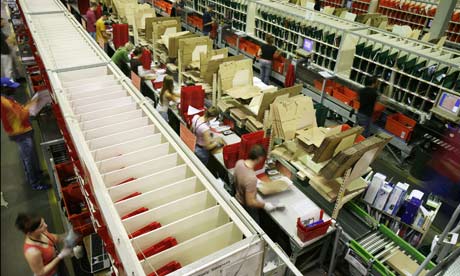
Perched on the end of a panel filled with writers who are throwing off the shackles of conventional publishing, surrounded by Kindle enthusiasts of every stripe, Mark Buckland found himself very much the odd one out at the Edinburgh international book festival. The head of the e-savvy independent publisher Cargo began by asking how many in the audience were self-published authors and wryly suggested he was "going to get lynched".
It's no surprise that an audience which had paid £10 a ticket to hear about writing in a digital age was mostly made up of authors, with a sizeable minority already publishing themselves, but the hostility Buckland faced as a representative of the publishing industry was something of an eye-opener.
Catherine Czerkawska, who described herself as a "classic midlist author", had already revealed how as publishers became bigger she found herself suffering from the "rave rejection", her agent telling her she was "too accessible … to be truly literary, but too literary to be popular", how she had uploaded her backlist to the Kindle store and "never looked back". Maggie Craig had just confessed how, for the first time since she had begun writing, Amazon had given her "a good monthly income", joking that if big publishers find a writer is making money "they call a meeting to find out what's going wrong".
But there was an audible intake of breath when Buckland suggested self-publishing has "given a voice to everybody, and that's not necessarily a good thing". With Amazon now controlling 90% of the UK market all that's happened is that one set of gatekeepers have been replaced with another, he continued. And Amazon "doesn't care about books".
Those who spoke from the floor mostly agreed with Craig when she argued that the discounting which has seen the price of ebooks plummet began with big publishers, citing a promotion of one of her novels in Asda which saw it selling at "a penny a book". But when Buckland raised the spectre of the demonetised cliff – an industry in which a handful of blockbusters lords it over a host of writers unable to make a living – the crowd asked how he planned to "put the genie back in the bottle", with a muffled cheer greeting the combative question "Who are you to define what culture is?"
Perhaps, like Neil Gaiman, you take the long view – it's only comparatively recently that writers have been able to make a living out of storytelling after all. Maybe you don't care if Jeff Bezos knows what page you're on as long as you can save a little money, but it's something of a shock for an independent publisher to find the room stacked against him at a book festival.
Readers and writers may sometimes feel they have been ill-served by traditional publishers, but I'm puzzled that their current troubles can be met with so much glee. As Buckland says, "I've had some bad sushi, but I'm not calling for the Japanese trawler fleet to be torched."

